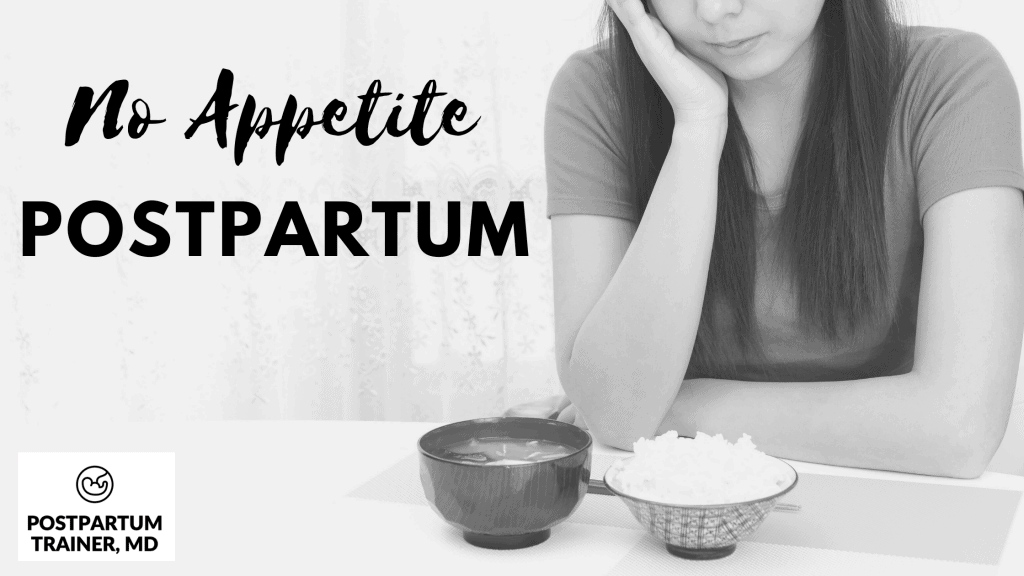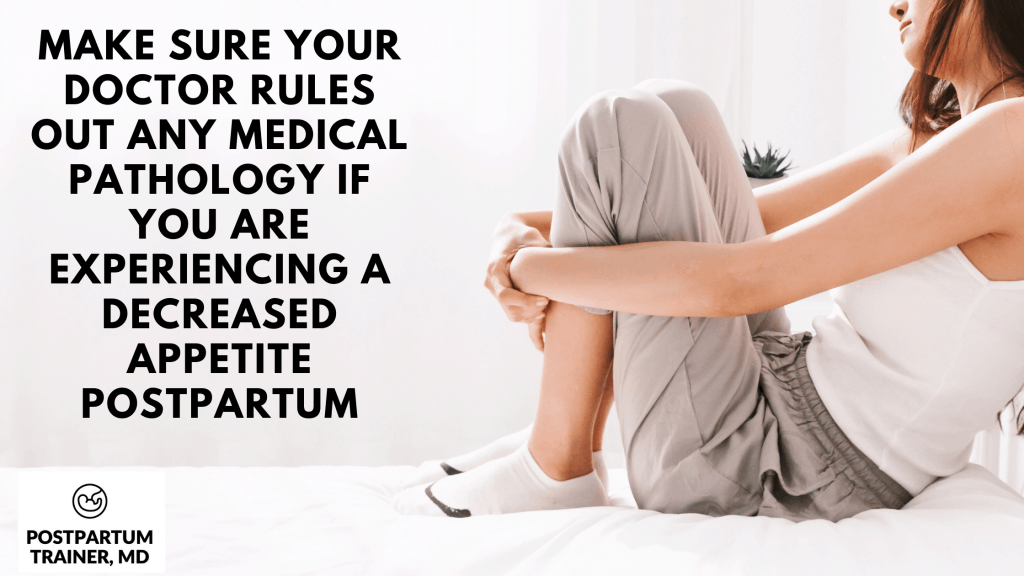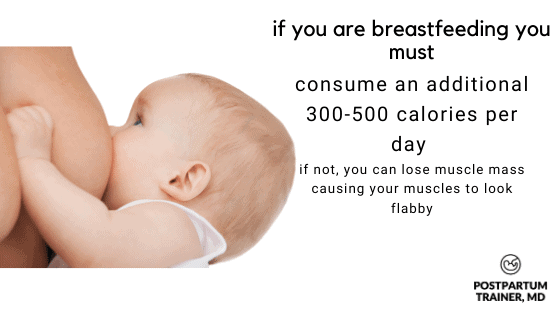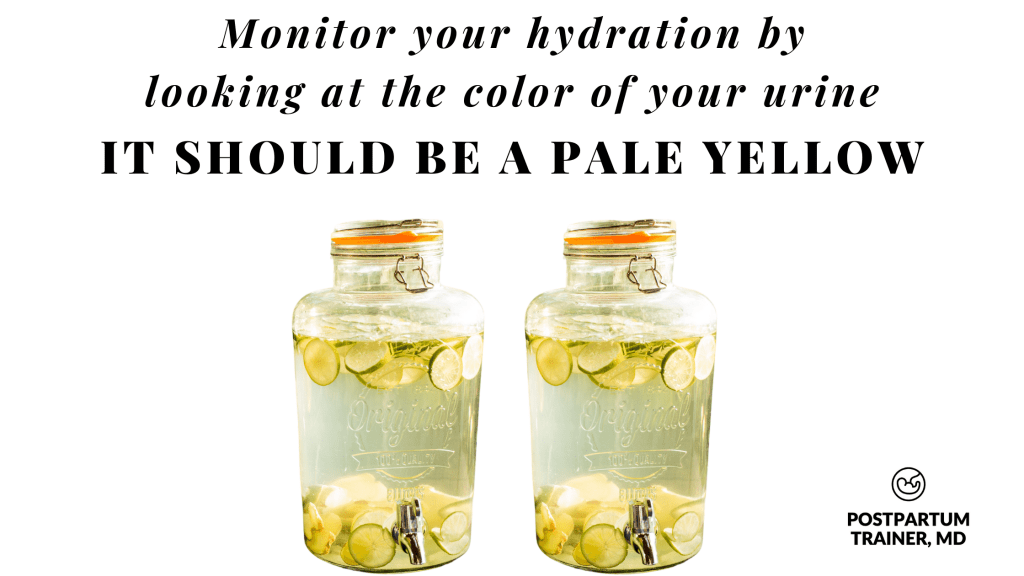Are you struggling with no appetite in the postpartum period? Do you feel like you have to force yourself to eat?
You are not alone.
In this post you are going to learn:
- Why your appetite can decrease postpartum,
- Medical problems that can be the cause of your decreased appetite, and
- How you can increase your appetite (especially if you are breastfeeding.)
Let’s get started.

Why Do I Have No Appetite Postpartum?
It may be normal in the immediate postpartum period to feel as though you have to force yourself to eat.
Foods you used to enjoy may now seem bland to you.
In some situations, this is completely normal.
Remember your body has changed drastically from being pregnant to now postpartum.
For example:
- your sleeping patterns have changed (especially lack of sleep)
- you may be experiencing some pain, and
- you have a new level of stress in your life, as a new parent, just to name a few
However one of the other changes that can affect your desire to eat is your hormone levels.
Specifically, progesterone.
Progesterone is one of the key hormones that stimulate your appetite.
In the postpartum, progesterone and estrogen levels drop sharply, which can play a role in decreasing your desire to eat.
With that said your decreased appetite should improve, as these hormonal imbalances will typically normalize in about 2-3 months.
However, it is important to note that there are other medical conditions that can lead to a decreased appetite.
Medical Issues That Can Cause A Decrease In Appetite
Aside from being a normal variant, a decrease in appetite for new mothers can be a sign of a more serious issue.
It is important to monitor your symptoms and get evaluated by your doctor if you think you may have any of the below conditions.
Here is a list of postpartum medical conditions that can cause a decrease in appetite.
- baby blues
- postpartum depression
- thyroid disorder, and/or
- anemia

Baby blues
Baby blues are feelings of sadness that occur within a few days after you deliver.
It is normal to experience emotional highs and lows during this time, especially in the first week.
The good news is, symptoms of baby blues often resolve by postpartum day 10.
If these feelings of sadness persist for more than 14 days and are accompanied by the symptoms mentioned below, you may have postpartum depression.
Postpartum depression
Postpartum depression (PPD) or postnatal depression is a very serious condition that can affect up to 7% of mothers in the United States.
It is diagnosed if you have five of the following nine symptoms within the first four weeks of delivery.
- Depressed mood
- Decreased energy
- Changes in sleep patterns
- Loss of interest in things you were once interested in
- Changes in your weight
- Inability to concentrate
- Feeling hopeless or guilty, like a bad mother
- Suicidal thoughts or thoughts of dying
- Agitation
If you have a history of depression, anxiety disorders, or other mental health conditions, you are at a higher risk of developing PPD.
If you have any of these symptoms of postpartum depression along with a loss of appetite, you should seek help immediately!
Thankfully, there are effective treatments for this condition. Your doctor can help create a treatment plan tailored to your needs.
Note: Postpartum psychosis is another condition that can mimic the above.
Thyroid disease
Thyroid disease can also be a reason for your decreased appetite as your thyroid is a key player in metabolism.
Women who suffer from hypothyroidism tend to have a decrease in appetite whereas those who suffer from hyperthyroidism have an increase in appetite.
Other symptoms of hypothyroid include:
- Fatigue
- Feeling cold all the time
- Weight gain
Anemia
Lastly, anemia can be a reason you do not have an appetite in the postpartum period due to the hormonal action of ghrelin.
Ghrelin is a hormone that functions primarily in food intake. It rises before a meal and drops after the meal.
Again, be sure to speak with your healthcare provider if you have persistent symptoms of decreased appetite to rule out medical pathology.
Moving on.
Can breastfeeding make you lose your appetite?
In general, breastfeeding should not make you lose your appetite. In fact, breastfeeding often increases your appetite.
This is because breastfeeding and producing breast milk actually burns calories which stimulates your metabolism.
Breastfeeding can burn anywhere from 300-500 calories depending on how often you are doing it, and for how long.

If you’re losing your appetite while breastfeeding, speak with your OBGYN physician.
How can I increase my appetite while breastfeeding?
There are three simple things you can do to try and increase your appetite postpartum.
They include:
- Consuming liquid calories
- Eating small but frequent meals
- Create a social association with your meals
To increase your appetite while breastfeeding you could try experimenting with different types of liquid calories.
The liquid calories I am referring to are coconut water, natural juices, protein shakes, green smoothies, etc.
This gives your body a quick intake of calories without occupying a lot of space in your stomach. As a result, your hunger hormones may slowly start to increase over time.
You must make sure you are not consuming the type of liquid calories that are loaded with added sugar as these provide very little nutritional benefit and can increase your risk of developing metabolic disorders later in life.
Here is a list of 17 delicious snacks you could consume while breastfeeding to keep your body satiated.
Secondly, you can experiment with eating small portions of food rather than a full meal at each sitting.
This way, your gastrointestinal system will expect to receive a certain number of calories every few hours, which in turn can stimulate your appetite accordingly.
This can help you get enough calories throughout the day when your overall food intake is minimal.
Lastly, you can try to make your meals more enjoyable by trying to eat together with friends and family.
Many people have found that a social event can help stimulate appetite more than if you are eating alone.
What will happen if I don’t eat while breastfeeding?
If you do not eat or drink while breastfeeding you run the risk of compromising your milk production.
In addition, you could experience the following symptoms:
- Unhealthy weight loss
- Tremors
- Brain fog
- Fatigue
- Dizziness
- Hypoglycemia
Do your best to eat a well balanced diet and try to remain well hydrated to maintain your milk supply!
Check out my breastfeeding meal plan to discover how to include more nutritious food into your diet.
How much water should I drink?
In the postpartum period, you should be drinking about half of your body weight in water, and slightly more if you are breastfeeding.
This means if you weigh 160lbs, you should be drinking approximately 80 ounces of water throughout the day.
If you are unable to measure your water intake, the best way to determine if you are drinking enough water is to look at the color of your urine.

Upon awakening, and throughout the day, your urine should be a pale yellow color.
If your urine is dark yellow, you are dehydrated and need to drink more water.
If your urine is colorless you are overdoing it! Slow down on the water intake.
Final Words on Postpartum Appetite
If you do not have an appetite in the immediate postpartum period, it is okay!
The hormones in your body are changing and this could certainly have an effect on your diet and metabolism.
If the symptoms persist (or are associated with any concerning symptom) you should seek medical attention to rule out any sort of medical problem.
This is especially true if you have any signs of postpartum depression.
So now I want to hear from you.
What was your appetite like in the postpartum period?
What did you do to increase your appetite?
Comment below and let me know.
Get Four Free Workouts To Help Strengthen Your Pelvic Floor & Heal Your Mommy Tummy!

Brittany Robles, MD, MPH, CPT
Brittany Robles is a full-time OBGYN physician, a NASM certified trainer, and a prenatal and postnatal fitness specialist. She holds a Master of Public Health degree in maternal health with a special interest in exercise and nutrition. She is also the co-author of The White Coat Trainer. Learn more about her here.
Sharing is Caring – Send This To A Mom In Need!
References:
- Asarian L, Geary N. Modulation of appetite by gonadal steroid hormones. Philos Trans R Soc Lond B Biol Sci. 2006 Jul 29;361(1471):1251-63. doi: 10.1098/rstb.2006.1860. PMID: 16815802; PMCID: PMC1642706.
- Anokye R, Acheampong E, Budu-Ainooson A, Obeng EI, Akwasi AG. Prevalence of postpartum depression and interventions utilized for its management. Ann Gen Psychiatry. 2018;17:18. Published 2018 May 9. doi:10.1186/s12991-018-0188-0
- Ghrayeb H, Elias M, Nashashibi J, et al. Appetite and ghrelin levels in iron deficiency anemia and the effect of parenteral iron therapy: A longitudinal study. PLoS One. 2020;15(6):e0234209. Published 2020 Jun 4. doi:10.1371/journal.pone.0234209

I’m 2 weeks post partum. I ended up needing a C-section so I was in the hospital for 4days. In the hospital I had an appetite. Now that I’m home I feel like I have zero energy and no interest in food. I talked to my Dr at my 2 week appt and she recommended trying Zoloft. Do you think that will help even things out?
Hi Crystal,
Thanks for your comment. Unfortunately, I cannot provide you with specific medical advice. I highly encourage you to speak closely with your doctor and other people you trust to make an informed decision over what is best for you. Best of luck!
Zoloft would be prescribed for PPD, if there other symptoms that may help. Not sure if it’s only for appetite, maybe ask to do blood work to check thyroid and iron levels too. Make sure you’re still taking your prenatal vitamin and vitamin D3.